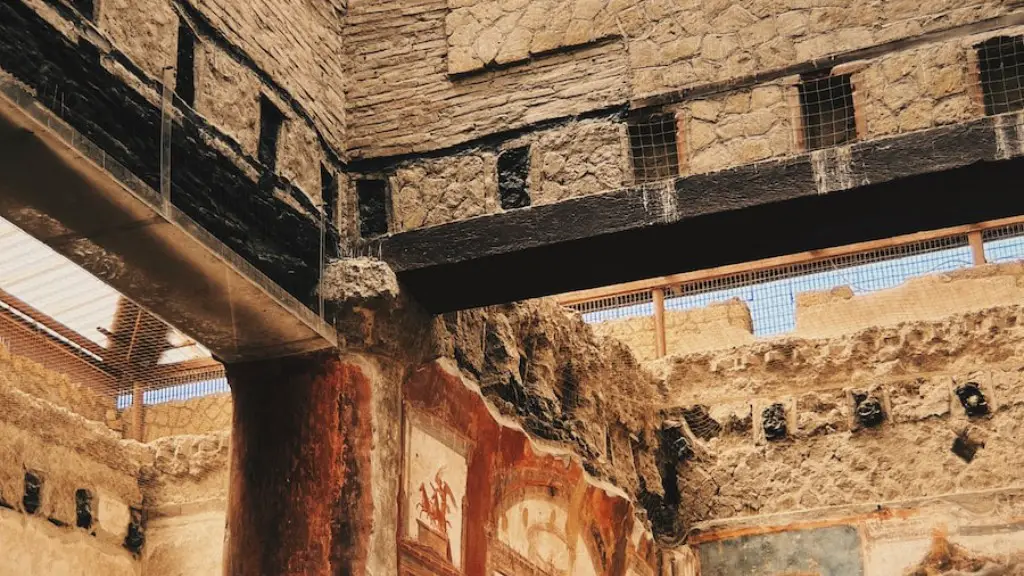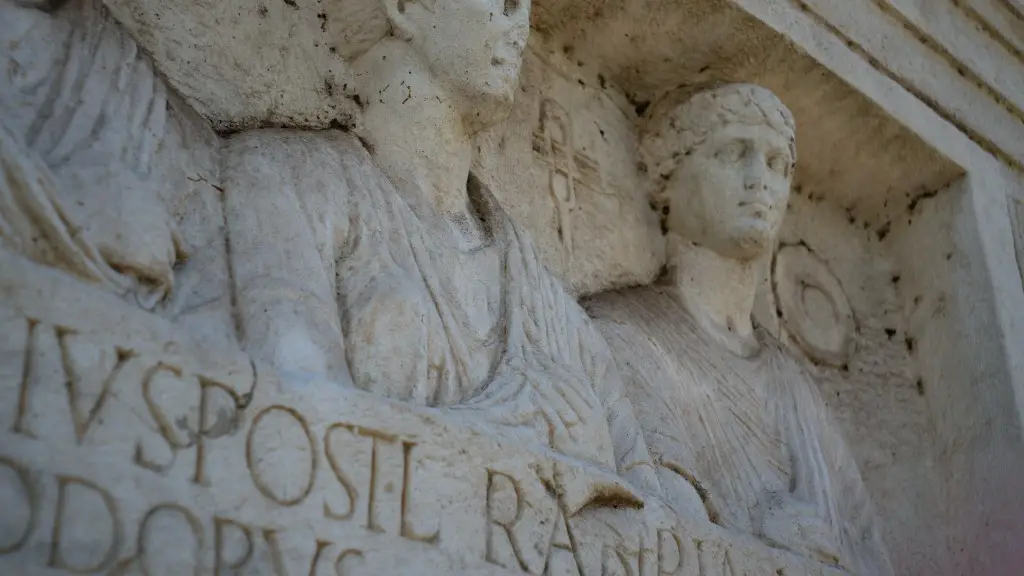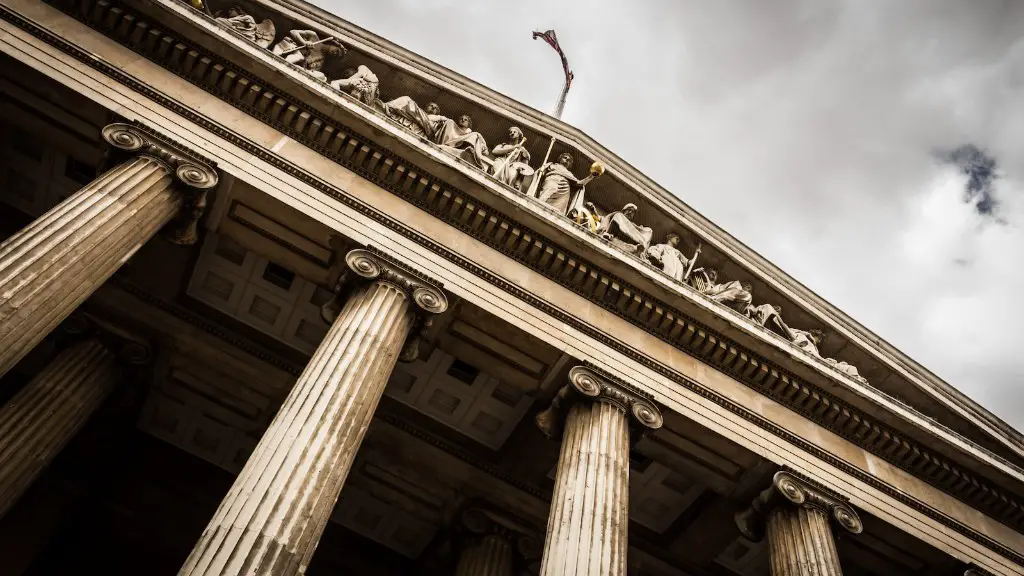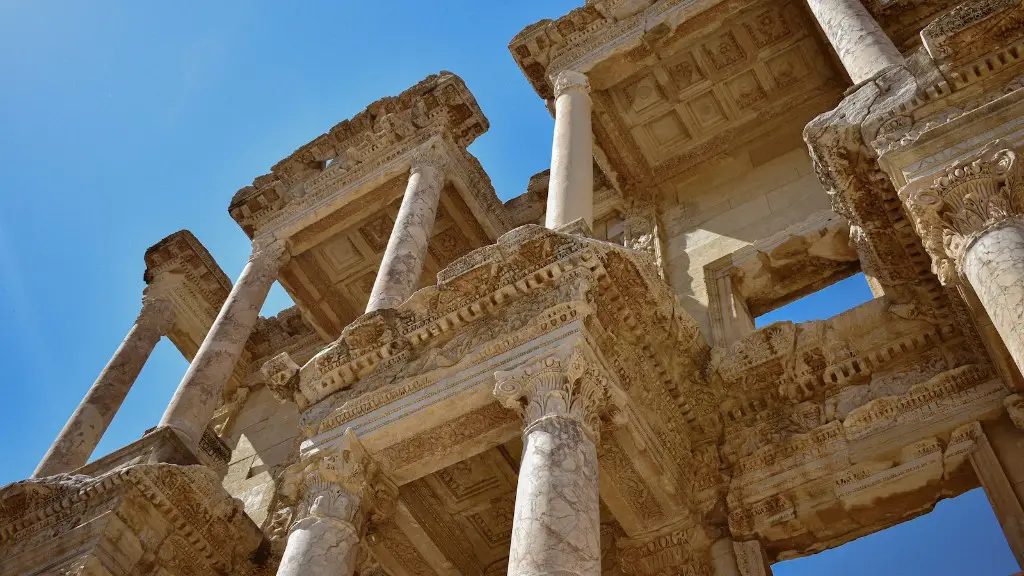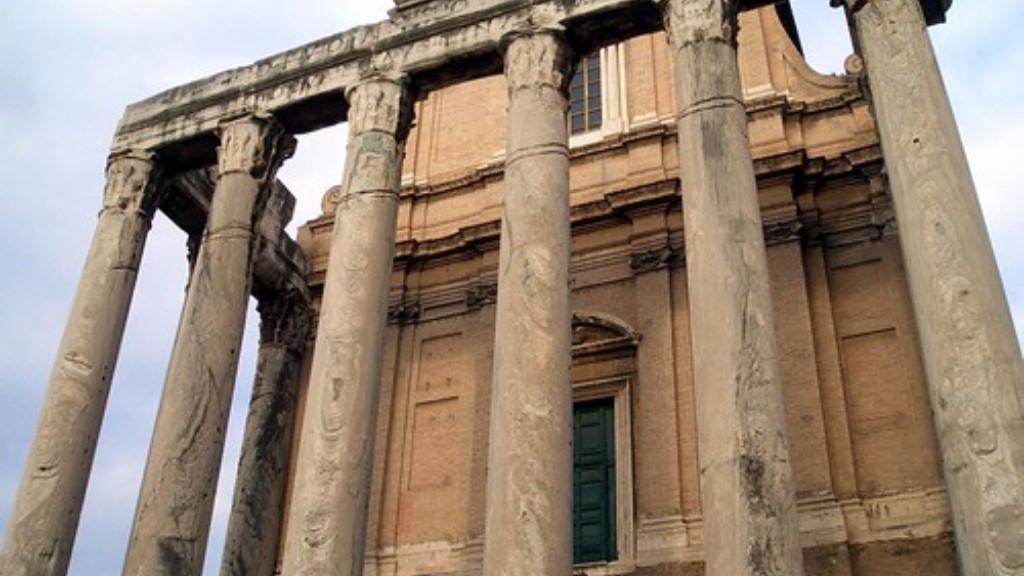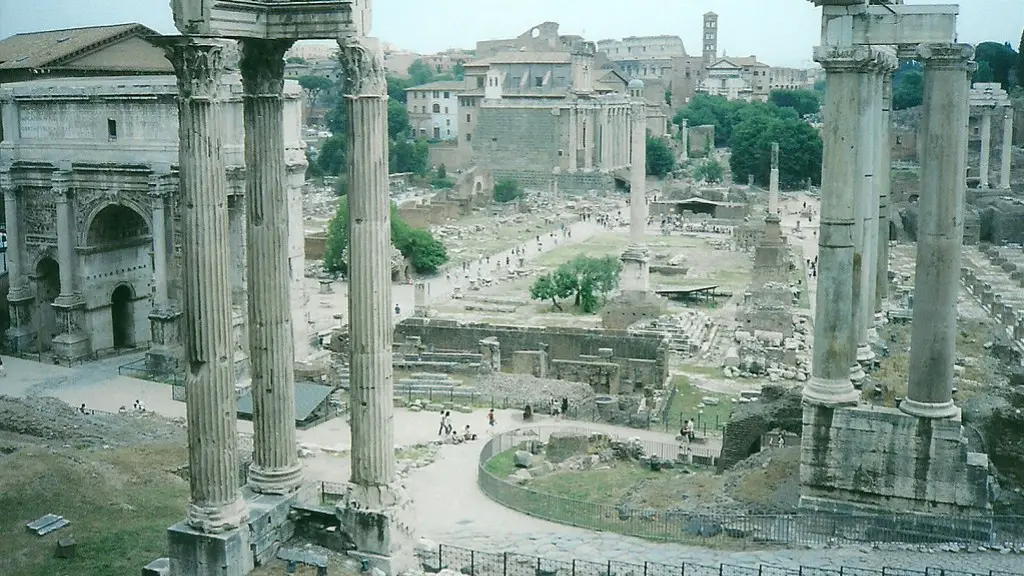What Was Trade in Ancient Rome?
The Roman Empire was one of the most powerful and influential empires of the ancient world. During its time, trade was a vital part of its economy and society. Trade networks spread throughout the vast imperial territories and across the Mediterranean, connecting the distant lands of Africa, Asia and Europe. As a result of its vibrant trade, the people of Rome had access to a wide range of foreign goods, greatly enriching their lives and civilisation. This article provides an overview of the the trade networks and commerce of the ancient Roman world.
Trade within the Roman Empire was conducted along two routes – the Via Maris, a maritime route connecting the eastern and western Roman provinces, and the Via Egnatia, a road route connecting the Adriatic and Aegean Sea regions. Within the city of Rome itself, the main market was the Forum Boarium, or cattle market, located near the Tiber River. Here, traders exchanged all kinds of commodities from the famous Roman ceramics and artworks to food, textiles, slaves, spices and animals from all over the world. The market was constantly bustling with people, showing the importance of trade to the Roman economy.
The Roman elite also participated actively in the trade networks and extremely wealthy individuals became known as ‘negotiatores’ or shippers. They owned large fleets of trading vessels, travelling far and wide to purchase luxury goods and other commodities from foreign lands. This allowed the Roman upper classes to enjoy the finest luxuries from all over the world, such as silk from India, spices from Arabia and exotic animals from Africa. Of course, mercenaries were also hired to guard the merchant ships on their voyages.
It wasn’t just luxury goods and commodities that were traded amidst the ancient Roman world. As Rome became an increasingly powerful state, vast labour networks also developed. This saw a large number of Roman citizens travelling abroad to pursue gainful employment, as well as to enlist in the military or even serve as slaves. This often provided tremendous economic opportunities for those involved and turned out to be lucrative for the Roman Empire as a whole, as these migrants and slaves would often bring back important knowledge and wealth to the Empire.
Another important aspect of ancient Roman trade was the development of trading cities and ports, which allowed the distant provinces to interact with one another, exchanging goods and supplies. These trading cities played an important role in increasing the Empire’s power and wealth. For example, the port of Ostia, located at the mouth of the Tiber River, came to be one of the most important trading ports in the Mediterranean Sea. Here traders from all over the world came to buy and sell their wares and it eventually became the largest port in the ancient world.
The Roman currency, or denarius, played an important role in the Roman trade networks, being the main unit of exchange. This allowed for an efficient and fair exchange of goods and services within the Empire. The denarius was made of high-grade silver and had a set weight and purity. This helped create stability and certainty within the trade networks and allowed merchants to conduct business with confidence. As a result, the denarius became one of the most widely used currencies throughout the ancient world.
Overall, trade was an integral part of the Roman Empire, not only providing economic opportunities but also a way to keep the distant provinces connected and maintain the political, social and cultural unity of the Roman world. It had a lasting impact on the development of the Empire and played a major role in shaping the ancient world.
Political Impact of Roman Trade
Trade in ancient Rome had a marked political impact, allowing the empire to expand its reach and influence. The growth of trade across provincial boundaries permitted the swift spread of Roman rule, control and authority. This allowed the Roman Empire to gain access to valuable material resources such as food, resources, labour and even knowledge. Through trade, Roman merchants also gained access to far-flung markets, particularly in East Africa and South East Asia, strengthening the Empire’s economic power and security.
The political impact of trade was further augmented by the prevalence of the Roman currency across a wide area. This facilitated the successful exchange of goods and services between the empire’s provinces, which in turn boosted empire-wide political stability. Roman trade also enabled an ever-increasing flow of goods and resources to the imperial centre, which in turn could be used to sustain military campaigns and secure favourable diplomatic ties with foreign states.
Furthermore, the growth of trade also enabled the Roman Empire to connect with more distant cultures, such as the Parthians and the Persians, creating bridges of understanding and peaceful trade relations. This allowed for a more peaceful political landscape and eventually helped maintain relative peace and stability with Rome’s rivals and neighbours.
In addition, the Pax Romana, or Roman Peace, enabled traders to move freely throughout the empire, thus increasing the flow of trade and further strengthening the political and economic power of the Roman Empire.
Social and Cultural Impact
The growth of trade had a tremendous social and cultural impact on the ancient Roman world. By introducing foreign goods and resources to the Roman provinces, trade helped stimulate the local economies and create new employment opportunities. This led to a rise in the living standards of many Roman citizens, especially the lower classes, and enabled them to enjoy a richer lifestyle.
The prevalence of foreign goods also greatly altered the social customs of the Roman world. For example, luxury goods imported from far-off lands such as spices, perfumes and exotic animals introduced a more diverse cultural landscape, leading to the adoption and promotion of different lifestyles and values. This had a tremendous impact on the society as a whole, as people began to view the world through different perspectives and become more accepting of cultural differences.
Furthermore, trade aided in the dissemination of culture, knowledge and literature throughout the Roman provinces. Through the exchange of goods, people from all around the Empire, from Greece to Germany, were exposed to new cultural traditions, religious beliefs and literary works, allowing for a greater understanding and appreciation of the Roman world.
Overall, trade had a profound social and cultural impact on the Roman world. It improved the economy and living standards, allowing the people to enjoy far-reaching cultural influences from all over the world. By exposing the Roman people to a variety of cultures, trade helped foster greater understanding and appreciation of different lifestyles and values. It was through trade that Roman culture, language and knowledge spread far and wide, leaving a lasting impact on the ancient world.
Economic Impact
The widespread trade networks of Rome provided a huge economic benefit to the empire, creating employment opportunities and stimulating local economies. The Roman traders used the denarius as their main currency, thus creating economic stability and certainty throughout the provinces. Taxes were also collected during the trading process, thereby bolstering imperial fund.
Trade also served to expand the Roman Empire’s coffers. Roman merchants were able to acquire many imports from far-flung lands, such as spices, perfumes and exotic animals, thereby greatly increasing the wealth of the empire. The merchants were also able to access distant markets and acquire new supplies to support the Roman economy.
In addition, the establishment of trading cities and ports allowed the distant provinces to interact with each other, exchanging goods and services. This increased economic cohesion and enabled the people to enjoy a more diverse range of products, thus stimulating the local economies. In fact, many cities such as Ostia prospered due to the growth of trade, becoming powerful economic metropolises.
Overall, trade in ancient Rome provided a huge economic benefit to the empire as a whole. Through trade, foreign goods and resources were brought into the Roman provinces, thus stimulating the local economies. Trade also enabled the Roman merchants to access distant markets and acquire new supplies to support the Roman economy. In addition, it allowed for efficient and fair exchange of services, bolstered by the use of the denarius. As such, the trade networks of ancient Rome played a vital role in the growth and prosperity of the Roman Empire.
Technological Impact
Trade also helped increase the technological progress of the Roman Empire. Through trade, the imperial territories were exposed to far-reaching technologies and inventions, leading to advances in engineering, agriculture and other fields. Innovative inventions such as the water mill, the windmill and the lathe quickly spread through the provinces, revolutionizing production and boosting the Roman economy.
In addition, trade enabled the spread of knowledge and expertise across the Roman Empire. Merchants, travelling scholars and other individuals introduced new ideas and inventions to their respective provinces, which in turn helped stimulate technological innovation and creativity. Through these exchanges, the Roman people also gained access to foreign resources and manpower, enabling them to rapidly develop new tools and weapons.
Furthermore, trade also enabled the Roman Empire to acquire new and improved ships, which allowed it to greatly expand its naval capabilities. By the first century CE, the Romans had developed sophisticated merchant vessels and warships, allowing them to traverse the Mediterranean and beyond. This enabled them to efficiently and confidently transport goods and resources across the seas and reach far-off lands.
Overall, trade proved to be an important factor in the technological progress of the Roman Empire. By introducing foreign resources and knowledge, trade helped spark innovation and creativity throughout the provinces and enabled the acquisition of new and improved ships and vessels. As a result, the Roman people were able to traverse distant seas and acquire materials that would eventually help them to become the most powerful and advanced empire of its time.
Environmental Impact
The growth of trade exercised a major environmental impact on the Roman world, leading to deforestation and the destruction of natural resources. The Roman merchants increasingly traversed the Mediterranean and other seas, leading to the cutting down of trees for shipbuilding and the widespread harvesting of marine life for nutrition. In turn, this caused severe environmental degradation.
The introduction of foreign species and animals from distant lands decreased biodiversity, as animals from one region were being brought into another, often with disastrous consequences. This led to the extinction of certain species and posed a serious threat to the environment. In addition, the increase in shipping activities also led to a rise in air and water pollution.
Furthermore, slave labour was also a major factor in the environmental damage caused by trade. Slaves were often used to mine precious metals and resources, leading to further destruction of the environment. This further increased the toll on Rome’s natural resources and caused further pollution in some areas.
Overall, the growth of trade had an immense environmental impact on the Roman world. Casualties of deforestation, species extinction and pollution weighed heavily on the environment, leading to a decrease in biodiversity and a rise in air and water pollution. This helped to create an ecological crisis that would have lasting consequences for the entire Roman world.
